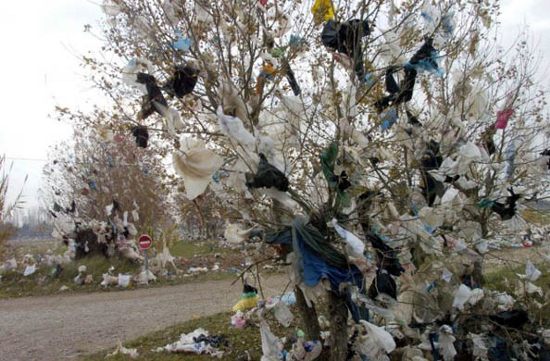Why dispose of batteries and where can they be handed over in your city? Silent killers. Why you can not throw away batteries and mercury lamps.
Hello friends!
Each of us has probably used batteries in our lives. Remotes, watches, toys, phones, a lot of other things - there is always something in the house that runs on batteries. And they have the ability to develop their resource. However, does everyone know what to do with spent batteries? Throw it in the trash along with the rest of your household trash? It is not right!
There is almost always a sign in the form of a crossed-out trash can on the battery case, indicating that it should not be thrown away with other household waste.
But what is so harmful or dangerous in batteries?
Although the battery may explode, leak and damage your equipment, or be swallowed by your child, it will do the most harm if it is not properly disposed of.
In general, batteries are chemical devices, the elements of which react to produce electricity, which we use. These elements are mostly toxic and dangerous.
- lead (accumulates in the body, affecting the kidneys, nervous system, bone tissue)
- cadmium (harmful to lungs and kidneys)
- mercury (affects the brain and nervous system)
- nickel and zinc (may cause dermatitis)
- alkalis (burn through the mucous membranes and skin) and others
And if a battery is burned in an incinerator, then all the toxic materials it contains will be released into the atmosphere.
According to statistics, a Moscow family annually throws out up to 500 grams of used batteries. In total, 2-3 thousand tons of batteries are being collected in the capital. In the United States, Americans buy almost three billion different batteries every year, and about 180,000 tons of these batteries end up in landfills across the country.
It is hard to imagine the damage being done to the environment on a global scale.
What to do with spent batteries?
It is not recommended to store at home, as hazardous substances are released into the air. According to the rules, they must be disposed of at special enterprises. Although the pleasure is not cheap, in developed countries the process of collecting used batteries from the public and subsequent competent disposal is well established. So, in many EU countries, in Canada and the USA, battery collection points are everywhere. In New York, for example, it is against the law to throw batteries in the trash. And manufacturers and large stores that sell batteries are required to collect used batteries - otherwise fines of up to $ 5,000 may follow.In Japan, they say, batteries are collected and stored until such time as optimal recycling technology is invented.
And what do we have?
Everything is rather sad with us: if you firmly decided not to harm nature, then you will have to carefully look for a reception point even in the capital - let alone other cities. There are only three factories in Europe with battery recycling capacities, and one of them is located in Ukraine - this is the Lviv State Enterprise "Argentum". However, due to the poor organization of the collection of batteries from the population, the plant cannot function - the enterprise is designed to process a ton of batteries a day, while in half a ton it was not possible to collect even half a ton.In the absence of state control, there are still collection points - they are often organized by volunteers (for which many thanks to them), but various organizations and retail chains are gradually being pulled up.
For the query “battery recycling”, Google gives quite a large number of mentions. I decided to systematize the information and plan to update the list periodically.
In order not to overload the article, posted on GoogleDocs - "List of collection points for used batteries"(information on Ukraine, Russia and Belarus).
If you have been wondering where to take old batteries, I hope this list will help you. Because it's not just batteries that contain hazardous materials, some locations may accept old appliances, computers, fluorescent lights, and the like.
P.S.: It is believed that one AA battery pollutes with heavy metals about 20 sq.m. soil. In the forest zone, this is the habitat of two trees, two moles, one hedgehog and several thousand earthworms. 
Be responsible, habrauser. Do not thoughtlessly throw away the battery - save the hedgehog!
Tags: Add tags
What can be done with dead batteries?
1. You can buy a diode in a radio magician, a resistance of 1 or 2 megaohms, a piece of wire, and a 220V plug. You can connect them at home to 220V in series, through a dead battery. And wait half a day or maybe a day. The battery will charge back and reach a new half charge, or 100% in some rare batteries. Batteries can be reused as rechargeable batteries many times, maybe 10 times or more. Charging with such a small microcurrent is the slowest, but the most gentle, which allows you to charge accumulators and batteries of any type and size. Even the watches are silver-zinc, and they can be charged thousands of times. Instead of 1 battery, you can connect in series and charge several batteries at once!
But it should be remembered that each type of battery (EMF of metals) has a maximum voltage above which charging can destroy the battery. For example, lithium batteries even explode when recharged. In general, you should not charge above 1.55V if you do not know the type of battery. Therefore, it is also ideal to get a small voltmeter or multi-meter to periodically turn off the charging and control the voltage on the battery.
It is even better to buy batteries called accumulators, where normal voltage not 1.5V, but 1.2V, but the number of recharges can be practically unlimited. For example, lead car batteries can be recharged up to 10,000 times, and can be recharged up to 100,000 times. And a special charger for them, do not get carried away with too fast charging, which destroys batteries. Batteries are a little scarce, and much more expensive, but this purchase is one-time and durable, which allows you to save the most money and time and resources in the long run.
2. Where can I find rare valuable metals for household use in chemical processes?
When photography was chemical, chemical compounds were sold everywhere in photo shops. And now raw materials have become scarce! Find nowhere! But something can be found in batteries.
The first batteries had a carbon rod inside, alkali in sawdust, and a zinc shell that oxidized - burned out when used, according to the formula Zn + O2 = Zn O2. If zinc oxide powder is heated, then pure zinc is released back, according to the formula Zn O2 \u003d Zn + O2.
Other batteries may contain slightly other even more valuable metals.
Almost all batteries are coated at both ends with 2 stainless nickel plates, very valuable for use as a non-oxidizing contact in any switch or flashlight.
You can potentially extract what you need from batteries in everyday life, if you don’t throw them away and don’t give them away for free to someone else’s uncle for his benefit, but collect them for many years in an airtight bag for yourself just in case.
3. In an era of depletion of the planet's resources, urban landfills can become very valuable deposits of rare substances. If you cannot collect a lot of dead batteries to extract the desired substance, then you can look for them in a landfill. But if you also have a stupid fashion in the city of destroying landfills by burning 100%, then there is nowhere to find it, and it is better to emigrate to more favorable places with landfills in another country.
By "throw away" we usually mean "send in the bin". So throw away the batteries, like energy saving light bulbs, by no means. Read our article to learn why you shouldn't throw batteries in the trash, what danger they pose and what to do with them!
About the dangers of batteries
A standard finger-type battery contains heavy metals that are dangerous not only for human and animal health, but also for the environment. According to statistics, one ordinary battery is capable of polluting with these metals a little less than 20 square meters soil!
Danger of heavy metals in the battery
Nickel, lead, manganese, zinc, mercury, nickel. In addition to their toxicity, these metals are also harmful because they can accumulate in living organisms.
For example, lead causes brain diseases, nervous disorders. in addition to the above, it affects vision, hearing, and the respiratory system. Considered an extremely dangerous substance, it accumulates in the kidneys, undermining their functioning.
Cadmium provokes cancer of the lungs and other organs, as it is a carcinogen. It is deposited in the liver, kidneys, bones, and thyroid gland.
What happens if you throw the battery in the trash?
If the battery goes to the trash, how can the harmful substances contained in it harm a person? And why should it end up in the soil if the garbage is then burned in incinerators or taken to a landfill?
The fact is that even if the battery does not come into direct contact with a person, animal or earth, it can still do harm: every summer, garbage in landfills rots, heats up and smolders, this is a natural state of affairs, but only a smoldering battery emits dioxins - poisonous compounds acting 67 thousand times stronger than cyanide. And if a battery ends up in incinerators along with other garbage, it doesn't just smolder, it burns, with more terrible consequences. Poisoning the air, we poison ourselves: residents of nearby cities suffer from cancer and reproductive diseases caused by poor ecology and dioxins.
How do heavy metals found in batteries get into the ground? On rainy days, batteries rust and oxidize. Rust can eat through the protective shell, or the battery can break under the pressure of other debris. There are many scenarios for the development of events, but the result is the same: dioxins and heavy metals, together with rainwater, penetrate into the ground, plants, and nearby water bodies.
Hazardous substances, penetrating, for example, into drinking water, are not removed from it either by boiling or by ordinary kitchen filters and enter our body. That is why batteries should be recycled separately from household waste.
How do I recycle a battery?
Source
Website of the movement "Hand over the battery - save the planet"
It's okay not to throw poison into the ground!
I love my country, but I consider myself a citizen of the world. That is why I try not to pollute as much as possible. environment. For example, I have been using an eco-bag for a long time. After all, plastic bags decompose in the earth for a very long time, turning the planet into a huge trash can.
We don’t even think about how we harm nature by throwing heaps of bags into the trash, which can actually be used much more often or replaced with alternative paper packaging. I am often looked at strangely at the checkout when I ask not to put bananas or a carton of milk in another carton. Often they don't even listen to me. Of course, the majority are simply not informed about the problem, because it has not touched them yet. But I am sure, continuing to live at the same pace, in 10 years everyone will have to think about protecting nature. After all, every morning we will need to admire the trees hung with bags, like toys on a New Year tree.

Batteries
Another problem modern society are batteries. The chemicals in batteries are very toxic. As they decompose, they pollute the environment. One small battery is able to pollute with heavy metals about 20 square meters of land. Toxic substances harm animals, plants and humans. Once in water bodies, they can pollute vast areas of land.

In Japan, batteries are not thrown in the trash. They are collected, waiting for brilliant scientists to come up with a reliable way to dispose of them. It is easy to find battery collection centers in Europe. Also at the state level, citizens are being informed about the dangers of batteries. In Ukraine and Russia, people are concerned about somewhat different problems. For example, why their beautiful photo got few likes. Or a more global question, why do we live so badly, when will we start to live well.
But here I would like to recall the pop, but the true phrase - you should start with yourself. For example, find out where in your city there is a battery recycling center or create one yourself in your entrance or office. If you already have an eco-bag, present one to your friends. In my opinion, an eco-bag is much more creative than a regular gift bag. And you can use it at least every day. If you do not care about the state of nature, then think about the pluses in your karma.

Where can I donate batteries?
- st. Zhilyanskaya, 26-A. Working hours from 10-00 to 18-00;
- Prospekt Pobedy st. 2. 1st entrance. sq. 15;
- st. Kikvidze, 26. Opening hours from 09-00 to 19-00;
- Eco Garant LLC Novopolevaya, 2; 227-9835.
- sq. Zhukova, 5A from 8 to 16;
- st. Malaya Gruzinskaya, 15



